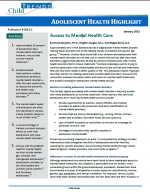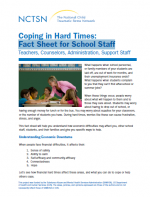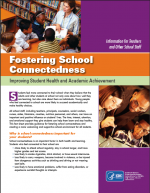Specialized instructional support staff include guidance counselors, social workers, school psychologists, and school nurses. Staff members usually have vast community networks and strong collaborations with external stakeholders whom they may enlist to help teachers and other staff members provide resources to students. This can be a tier 1 intervention that addresses universal instruction like social emotional learning in the school curriculum or trauma-informed practices embedded in teacher’s professional development. Often, specialized instructional support staff members hold advanced training or degrees in counseling and can provide training to teachers, staff, and families that will foster a caring school climate. Tier 2 (targeted and group) and tier 3 (intensive, individualized) interventions tend to be led and conducted by specialized instructional support staff for students who have additional needs regarding their academics and emotional well-being.
School support staff members such as guidance counselors, school resource officers, nurses, social workers, and special education aides play critical roles in helping students acquire the resources they need to achieve academically. In particular, they can link students to special services when issues interfere with academic learning. They can also create opportunities for students to authentically envision their future that allows them to go beyond the traditional path with the necessary support and guidance. The school setting can be a place for students to learn more about their own interests and the full range of opportunities in the world that they may not learn about in the classroom or at home.
Specialized instructional support staff and other personnel, including food service, building services, and other school support staff also frequently mentor students in their buildings. In this role, they are able to build trusting relationships with students and help to connect them with others in and outside the school. In addition, positive messaging goes beyond what is posted on bulletin boards in the hallways. Creating a relationship with students can lead to a positive connection and mentorship. Support staff and school personnel can all effectively create a caring learning community, inside and outside the school, through modeling positive behaviors. Provide opportunities for support staff to work closely with students on an activity or a project in the school. Inform students how they can be volunteer in the community or share with them part-time or summer job opportunities or internships with community organizations or local businesses. When staff members' actions are consistent in the school building, throughout the district, and in the community, they are acting as role models not only to students, but to their families as well.
Cook, A. L., Fettig, A., Morizio, L. J., Brodsky, L. M., & Gould, K. M. (2018). Culturally relevant dialogic reading curriculum for counselors: Supporting literacy and social-emotional development. Journal of Child and Adolescent Counseling, 4(1), 67-80.
Ray, S. L., Lambie, G., & Curry, J. (2007). Building caring schools: Implications for professional school counselors. Journal of School Counseling, 5(14).




